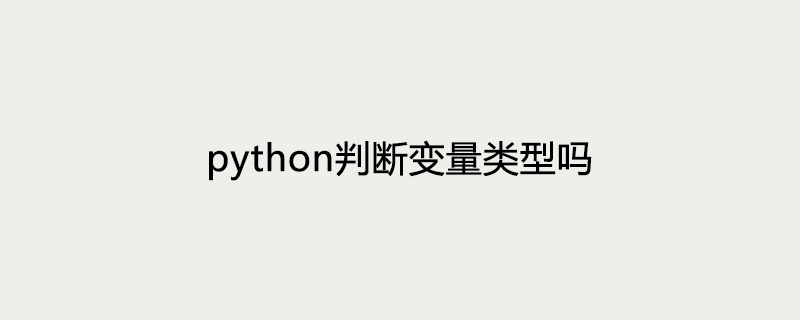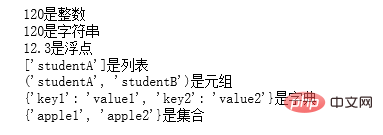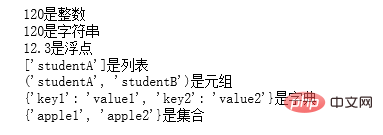
Python의 데이터 유형에는 숫자(int), 부동 소수점(float), 문자열(str), 목록(list), 튜플(tuple), 사전(dict), 집합(set)이 포함됩니다.
일반 다음 방법:
1, isinstance(매개변수 1, 매개변수 2)
설명: 이 함수는 변수(매개변수 1)가 type()
과 유사한 알려진 변수 유형(매개변수 2)인지 확인하는 데 사용됩니다.Parameter 1: 변수
파라미터 2: 직접 또는 간접 클래스 이름, 기본 유형 또는 이들로 구성된 튜플일 수 있습니다.
반환값: 객체의 유형이 매개변수 2의 유형(classinfo)과 동일하면 True를 반환하고, 그렇지 않으면 False를 반환합니다.
예:
#判断变量类型的函数
def typeof(variate):
type=None
if isinstance(variate,int):
type = "int"
elif isinstance(variate,str):
type = "str"
elif isinstance(variate,float):
type = "float"
elif isinstance(variate,list):
type = "list"
elif isinstance(variate,tuple):
type = "tuple"
elif isinstance(variate,dict):
type = "dict"
elif isinstance(variate,set):
type = "set"
return type
# 返回变量类型
def getType(variate):
arr = {"int":"整数","float":"浮点","str":"字符串","list":"列表","tuple":"元组","dict":"字典","set":"集合"}
vartype = typeof(variate)
if not (vartype in arr):
return "未知类型"
return arr[vartype]
#判断变量是否为整数
money=120
print("{0}是{1}".format(money,getType(money)))
#判断变量是否为字符串
money="120"
print("{0}是{1}".format(money,getType(money)))
money=12.3
print("{0}是{1}".format(money,getType(money)))
#判断变量是否为列表
students=['studentA']
print("{0}是{1}".format(students,getType(students)))
#判断变量是否为元组
students=('studentA','studentB')
print("{0}是{1}".format(students,getType(students)))
#判断变量是否为字典
dictory={"key1":"value1","key2":"value2"}
print("{0}是{1}".format(dictory,getType(dictory)))
#判断变量是否为集合
apple={"apple1","apple2"}
print("{0}是{1}".format(apple,getType(apple)))Return:

2. 알려진 유형 비교
예:
#判断变量类型的函数
def typeof(variate):
type1 = ""
if type(variate) == type(1):
type1 = "int"
elif type(variate) == type("str"):
type1 = "str"
elif type(variate) == type(12.3):
type1 = "float"
elif type(variate) == type([1]):
type1 = "list"
elif type(variate) == type(()):
type1 = "tuple"
elif type(variate) == type({"key1":"123"}):
type1 = "dict"
elif type(variate) == type({"key1"}):
type1 = "set"
return type1
# 返回变量类型
def getType(variate):
arr = {"int":"整数","float":"浮点","str":"字符串","list":"列表","tuple":"元组","dict":"字典","set":"集合"}
vartype = typeof(variate)
if not (vartype in arr):
return "未知类型"
return arr[vartype]
#判断变量是否为整数
money=120
print("{0}是{1}".format(money,getType(money)))
#判断变量是否为字符串
money="120"
print("{0}是{1}".format(money,getType(money)))
money=12.3
print("{0}是{1}".format(money,getType(money)))
#判断变量是否为列表
students=['studentA']
print("{0}是{1}".format(students,getType(students)))
#判断变量是否为元组
students=('studentA','studentB')
print("{0}是{1}".format(students,getType(students)))
#判断变量是否为字典
dictory={"key1":"value1","key2":"value2"}
print("{0}是{1}".format(dictory,getType(dictory)))
#判断变量是否为集合
apple={"apple1","apple2"}
print("{0}是{1}".format(apple,getType(apple)))반환:

보충:
isinstance() 및 type() 차이점:
type()은 하위 클래스를 상위 클래스 유형으로 간주하지 않으며 그렇지 않습니다. 상속 관계를 고려하십시오.
isinstance()는 하위 클래스를 상위 클래스 유형으로 간주하고 상속 관계를 고려합니다.
두 유형이 동일한지 확인하려면 isinstance()를 사용하는 것이 좋습니다.
관련 튜토리얼 권장 사항: Python 비디오 튜토리얼
위 내용은 Python은 변수의 유형을 결정합니까?의 상세 내용입니다. 자세한 내용은 PHP 중국어 웹사이트의 기타 관련 기사를 참조하세요!